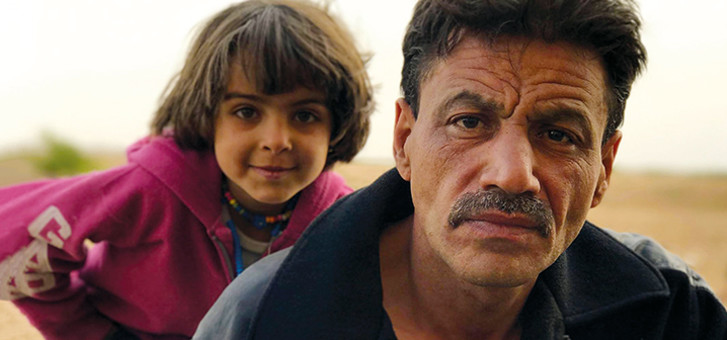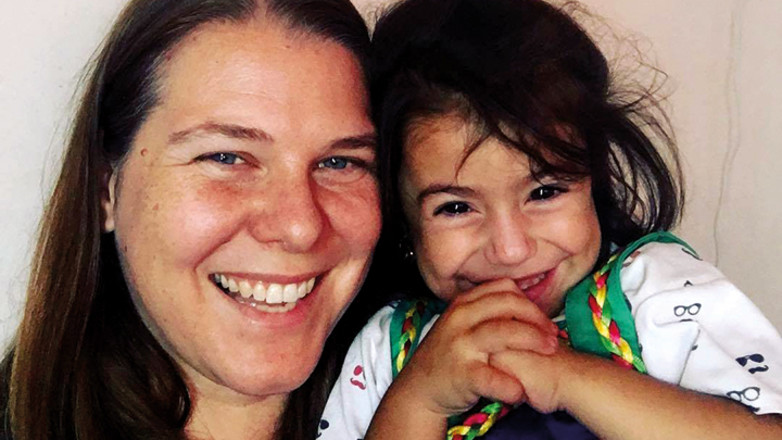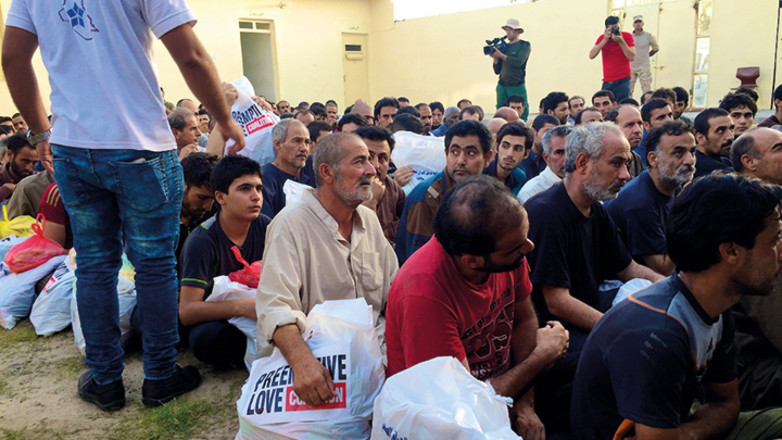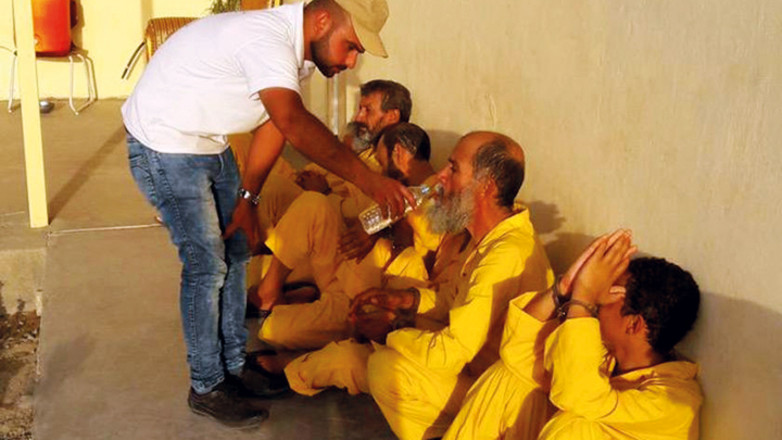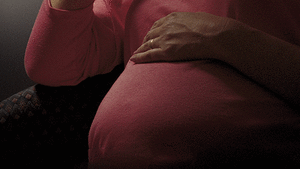In 2014, terror earned a new name: ISIS—the self-proclaimed Islamic State of Iraq and Syria. Amid Iraq’s long-running civil insurgencies and the failed promise of Syria’s Arab Spring, ISIS fighters stormed seemingly out of nowhere into Mosul, Iraq’s second-largest city. Iraq’s under-prepared security forces turned tail and ran. ISIS quickly established their reputation as the most ruthless terrorist group in the world; their YouTube videos of public beheadings, crucifixions and suicide bombings went viral. Inspired by their notoriety, other terrorist groups swore allegiance to ISIS and radicalised new recruits came from around the world to join the battle. For most observers, the situation was horrifying, paralysing, unthinkable.
In 2014, Americans Jeremy and Jessica Courtney and the non-government organisation (NGO) they’d founded had a decision to make. They’d been in Iraq since 2006, providing heart surgery to children, many of whom would have died otherwise. Now the couple had two young children of their own and other NGOs were leaving the country as the security situation worsened.
“More than a million people were displaced and in need of food, water, shelter, medicine and every single other thing people need to survive. And we had a very important conversation in the office: are we going to sit by and say we don’t have a mandate to serve in this time, or are we going to respond to this moment and take responsibility for this stewardship we’ve been given?” Jeremy Courtney recalled in an interview with Christian Today. “It was a very short conversation.”
The Courtneys’ NGO runs under the provocative name, Preemptive Love Coalition (PLC). This moniker reflects its 2006 origins; a poke in the eye for George W Bush, who authorised preemptive military action, most infamously by invading Iraq to prevent the use of weapons of mass destruction that didn’t exist.
But, politics aside, Preemptive Love Coalition is also a name with spiritual implications. While the Courtneys tend not to trumpet their Christianity in Muslim-majority Iraq, it’s clear that the life and teachings of Jesus Christ undergird their work, which now focuses on the more than 10 million people made homeless by war in Iraq and Syria. “God demonstrates his own love for us in this: while we were still sinners, Christ died for us,” wrote the apostle Paul in Romans 5:8. That’s preemptive love—not waiting for messed up human beings to get their act together, smarten up and deserve eternal life, but making the ultimate sacrifice up front . . . as a gift.
When a person accepts this divine preemptive love, we call them a Christian. One of their important next steps is to pay it forward; to find places and people in need of this same kind of radical compassion. For PLC, this means providing emergency food, water, hygiene packs, shelter and job training to Sunni and Shia, Catholic and Orthodox, Yazidi and Mandaean. Most of these displaced people will never have the means to repay the kindnesses of PLC and other agencies. But it doesn’t matter; what’s important is their need.
From a Christian perspective, living out preemptive love often means stepping into enemy territory, where the work of sin and the devil has done its worst in creating human misery. That’s why you’ll often find Christian organisations involved in poverty reduction, hospitals, and caring for orphans, the disabled and the aged. From PLC’s perspective—an organisation run by Christians, Muslims and others—the enemy is not just spiritual, but flesh and blood; black-turbaned and wielding Kalashnikovs.
Yes, ISIS. According to Matthew Willingham, PLC’s senior field editor in Iraq, his colleagues have had fatwas and death threats made against them. “We’ve seen friends murdered, martyred and kidnapped,” he wrote in a blog post in 2016. “We’ve wept beside mass graves and watched ISIS chemical rockets slam into communities. Members of our team have been bombed and held at gunpoint—because love means going to the hard places.”
But things changed last year as the world’s terrorist bogeyman met its demise, best illustrated by the liberation of Mosul by Iraqi and international forces. Small pockets of resistance remain and random acts of terror under the banner of ISIS continue around the world. But in terms of its control over territory, ISIS is defeated.
This new phase has posed a new challenge to one of PLC’s favourite taglines: Love Anyway. The reality of ISIS today involves rows of jumpsuited prisoners, helplessly awaiting their fate in formal or informal detention. “Love your enemies,” said Jesus. But surely He didn’t mean monsters like ISIS?
Or did He? Jesus’ words were spoken in first century Palestine, a region under Roman military occupation. This was a regime that considered beheading a merciful punishment; a regime that invented crucifixion and inflicted it far more frequently and systematically than ISIS ever has.
Love your enemies? PLC has taken the message to heart. A blog post by PLC communications officer Erin Wilson expresses concern about the US military’s publicly stated intention to shoot down any remaining foreign ISIS fighters rather than seeking their capture or surrender. “How we treat ISIS fighters isn’t about them or what they deserve. It’s about us,” says Wilson. “If these fighters—our former neighbours—don’t deserve the chance to come home and face justice and maybe be reformed . . . then none of us do. There aren’t two levels of citizenship; there aren’t two classes of human beings. If due process isn’t extended to everyone, it can be denied to anyone.”
While Wilson’s compassion for the worst terrorists the world has seen in recent years may be hard to swallow, she does make a pragmatic point. Around the world the “war on terror” has been used to justify a weakening of civil liberties and the strengthening of the surveillance state. We might feel that justice is served when terrorists are stripped of every possible human right—after all, what rights did they allow their victims? But in the heat of vengeance we forget that we are also left more vulnerable when these rights and liberties are compromised.
But Wilson’s analysis goes deeper than self-interest. “We all know that ISIS members have carried out heinous crimes,” she concedes. “But these men and women aren’t cockroaches [to be eradicated]. They are human beings. They are our human beings. And continuing to dehumanise them will only make the problem worse.”
The Preemptive Love Coalition put this philosophy into practice in a way that surprised many observers. Hearing that hundreds of men accused of fighting for ISIS were being held in a desert detention centre outside Fallujah, PLC gained permission to include the compound in their delivery of emergency supplies. “When we proposed this distribution to Iraqi leaders, some were astonished,” remembers Matthew Willingham. “‘How did you even think to do this?’ one asked. ‘We haven’t heard this idea from anyone else.’ Others said, ‘You can’t do that! They’re getting what they had coming to them.’”
At the detention centre, the PLC team discovered miserable, overcrowded conditions. “In one compound we visited, a space meant to hold 40 contained over 600 men,” says Willingham. “Most detainees had scabies or some other skin condition. Some were suffering seizures. There was not enough food or water. Almost all of the men were still wearing the clothes they were arrested in . . . . Many of these detainees have been held in a state of limbo—they haven’t been definitively connected to ISIS, but they haven’t been cleared of suspicion either.”
But some, Willingham says, are confirmed ISIS murderers. “Their guilt is not in doubt.” Sadiq, a Muslim PLC team member visiting the compound, recognised one of the killers from an ISIS YouTube video that featured the brutal execution of a man known to Sadiq. But in the compound, the tables were turned—the murderer was on his knees and blindfolded. Sadiq approached with his bottle of water; the man’s hands were bound so Sadiq had to pour the water into his mouth. “You killed my friend. But I’ve come to feed you,” said Sadiq.
“ISIS beheads and burns its enemies,” says Willingham. “That’s why we must feed and clothe ours. ISIS distorts faith to justify killing. That’s why we must seek the best of faith to preserve life and overcome corrupted religion.”
“ISIS gives people a reason to kill,” adds Erin Wilson. “We can give people a reason to live. We can be the kind of people who prove ISIS wrong . . . . And we can be the kind of people who look at those of us who make the very worst choices, who have perpetuated unthinkable crimes, who have extended no mercy to others—and still reach across that enemy line.
“We can be the kind of people whose love can unmake violence.”
To learn more about the work of the Preemptive Love Coalition visit PreemptiveLove.org.

